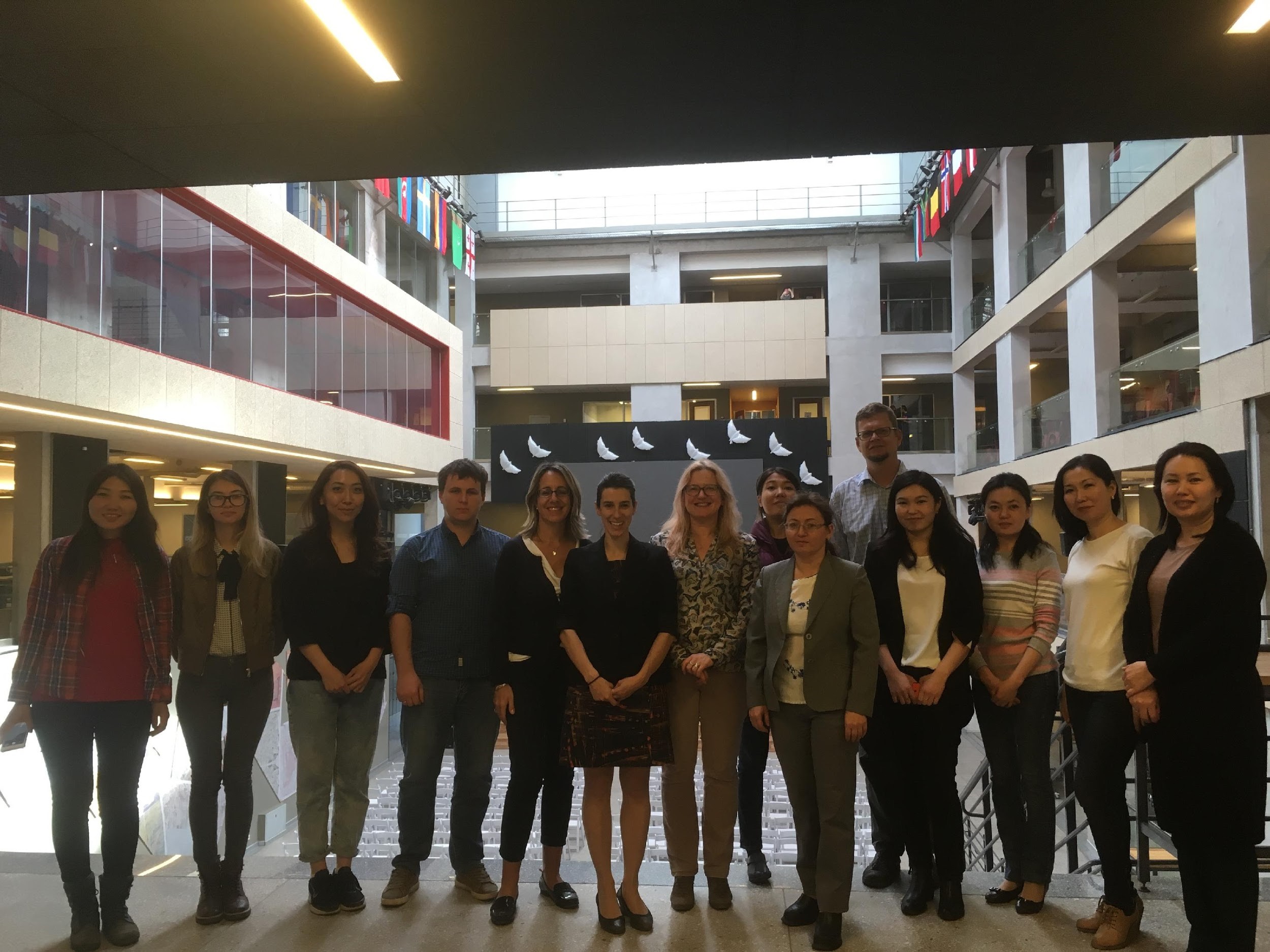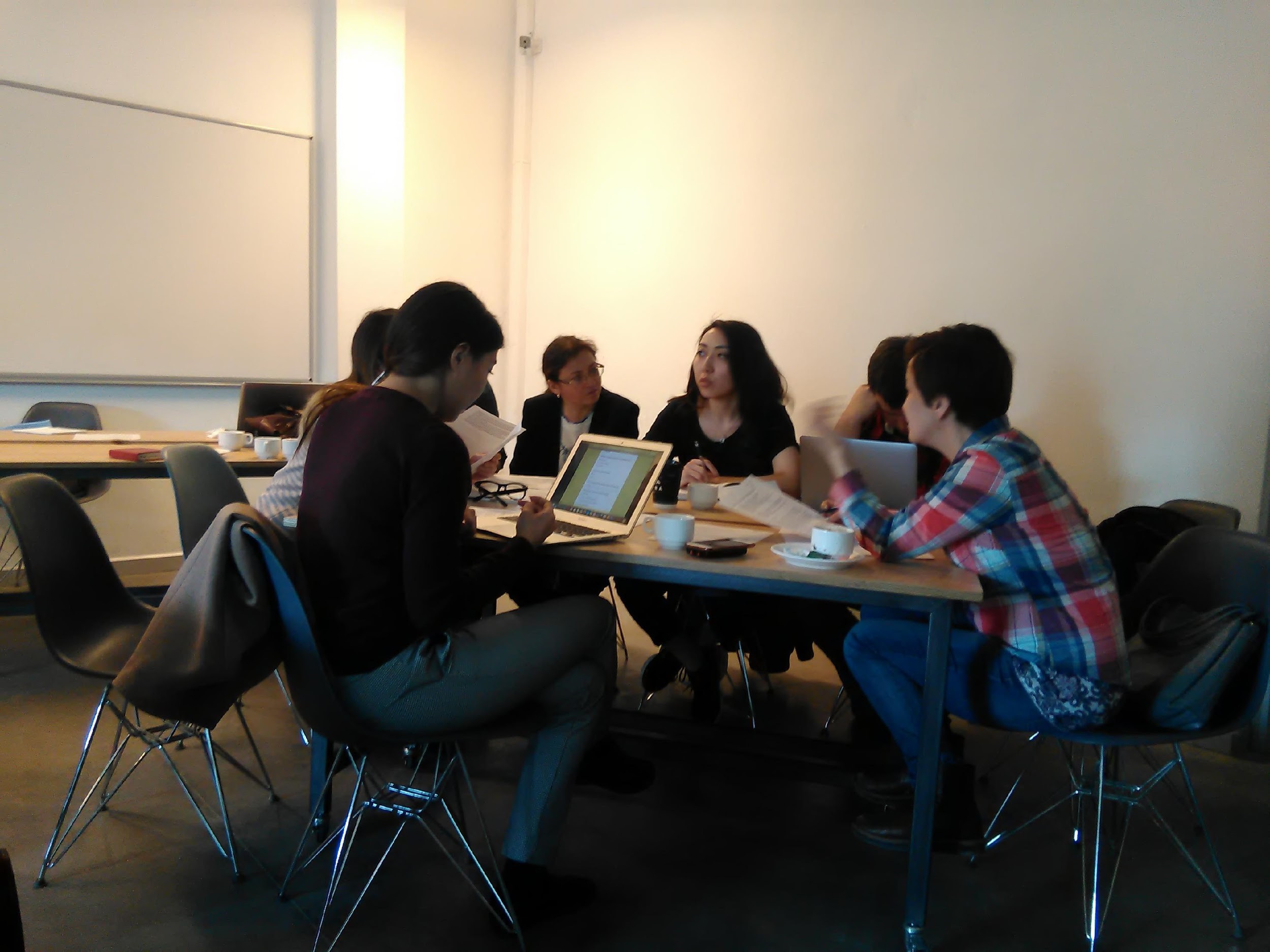

In March 2018, during the local Spring break, Veerle Van Den Eynden and Louise Corti from the UK Data Service visited Kyrgyzstan to provide training on research data sharing.
The main focus of their visit was to support creating a large collection of sensitive interviews, case studies and focus group discussions from the national Gender in Society Perceptions Study (GSPS).
This followed an enquiry by United Nations (UN) Women Country Office in the Kyrgyz Republic a year ago.
Veerle and Louise offered advice on anonymization and sharing of the data and the possibility of using the UK Data Service as a place of deposit due to there being no full-fledged Kyrgyzstani data repository.
This was followed up with a training workshop to advance the data management and sharing capacity in the country, organised by the Principal Investigator of the study, Meghan McCormack, who is also a law lecturer at the American University of Central Asia (AUCA).
The training event was supported by AMICAL (American International Consortium of Academic Libraries) with the UK Data Archive offering pro-bono training time for Veerle and Louise.
Kyrgyzstan and the American University of Central Asia
The Kyrgyz Republic is a small country with around 6 million inhabitants, with higher education becoming an increasingly important feature of society. It has 50 Institutes of Higher Education in which some 220,000 young people study for undergraduate degrees (2014/5).
Historically, the country is also known for being a stopping point along the Silk Road, the ancient trade route between China and the Mediterranean.

The American University of Central Asia (AUCA) in the capital, Bishkek, was founded in 1993 in the American liberal arts tradition and aims to develop ‘future leaders for the democratic transformation of Central Asia’. It runs preparatory programmes, undergraduate majors and a small number of graduate programmes. The university has formal partnerships with other universities and organizations worldwide.
The Gender in Society Perceptions Study
The Gender in Society Perceptions Study (GSPS) was a nation-wide research study undertaken arising out of the work of the Kyrgyzstani regional office of the United Nations Entity for Gender Equality and the Empowerment of Women, set up in 2010.
Data was collected at household, community and public level as well as information on key risk factors for gender inequality and threats of violence affecting women and girls in the Kyrgyz Republic.
This work was achieved through a partnership between:
- UN Women,
- the UN Population Fund
- the International Organization for Migration
- the Ministry of Labour and Social Development
- the National Statistical Committee of the Kyrgyz Republic
This article (in PDF format) gives more details of the GSPS.
3–day training programme
A group of 17 women and men from AUCA, UN Women and the University of Central Asia (UCA) participated in the training held at the new AUCA campus in the capital, Bishkek.
Participants were researchers from:
- the AUCA business school,
- law, gender and education studies,
- AUCA IT and library staff,
- UN Women researchers
- staff from the UCA Mountain Societies Research Institute, developing a content management system for the institute’s research outputs and resources.

Day 1: To Share or Not To Share: Meeting ethical and legal issues for data sharing
The 3-day event started with a round of introductions and a ‘To Share or Not to Share’ debate.
Participants divided into two groups discussing either pros or cons of sharing data from a research study on violence experienced by women. The groups unearthed many poignant and valid concerns around protecting identities.
They also highlighted the moral duty to share data, where public funds have supported the research. It was also recognised that research integrity is best promoted through transparency of findings which requires the ability to revisit the data underpinning publications.
The ethical and legal aspects of managing and sharing sensitive data continued to be an important focus for the rest of the day.
While preparing for the training workshop, we found it interesting to note that Kyrgyz data protection legislation is very similar to the European Union’s General Data Protection Regulation from a legal and ethical standpoint. However, participants noted that enactment and enforcement is often problematic.
Institutional Review Boards (IRBs) (the equivalent of Research Ethics Committees) are only slowly setting up in Kyrgyzstani research-active universities. This is primarily in response to journal data sharing demands and the need to submit, along with the publication and replication data, an approved Ethics Review document.
Participant Jayarethanam Pallai, the Dean of AUCA’s School of Entrepreneurship and Business Administration (SEBA) and head of the new AUCA IRB, was grateful for the discussion on the role of IRBs in highlighting tensions between data protection and data sharing and raised the point that practical advice and examples could be usefully brought into IRB members’ training. As part of its ethos, AUCA is committed to research integrity, critical inquiry and freedom of expression.
One issue raised related to worries by training participants about possible unintended data breaches due to the very small population available for surveys in the country.
While Kyrgyzstan lacks the tight regulation and guidance that many countries in Europe have regarding the collection, processing and use of personal information, protocols to mitigate against data breaches happening should be considered if contracting out social survey work.
Exercises were used to bring the topics to life.
Exploring wording in consent forms, participants were asked to evaluate the consent statements used for the GSPS interviews and focus group discussions, to decide whether they might change the wording to facilitate the sharing and future reuse of the data.
While the use of written consent forms is not mandated in Kyrgyzstani law, some scholars did say they use them to promote ethical working and also to protect themselves.
Exercises on anonymisation of qualitative data and basic disclosure review of survey data looked at UK Data Service collections such as the Millennium Village study.

On the issue of controlling access to data, especially on sensitive topics, the data producers felt that open access would not be possible for detailed GSPS data and that some form of safeguarding would be needed.
An open teaching dataset based on non-sensitive and anonymized sub-sections of the data certainly could be produced if resources became available. A suggestion was to limit access to academics to be certain that the data would not be exploited in the wrong way or fall into the wrong hands.
It’s important to recognise the local context, which may not be comparable to the situation in more fully democratic nations, where trust in data users from across the sectors is often implicit, and accountability much easier to manage.
Again, this topic was illustrated with local examples of data from Kyrgyzstani research shared in various repositories under varying access conditions. One example was data from a study on Fair Trails in Kyrgyzstan, of which Meghan was a co-author.
Day 2: The art of data publishing
On day 2, data publishing, creating documentation and reuse of data were covered.
A selection of UK data repositories was showcased to give examples of the different scale of investment and progress undertaken by different institutions.
Larger research-intensive UK institutions have invested in research data management infrastructure and activity – from building advisory and support services to enabling trusted data storage. Other institutions have chosen smaller lighter-weight solutions that simply offer a place to publish data, or even just metadata.
Our advice is always to assess what an institution might need in terms of scale and scope of publishing data, the choice and affordability of technology and software, and how (new) roles and responsibilities might be allocated. Federating knowledge and work within a country or known collaborators is always advantageous.
An area highlighted for Kyrgyzstani universities (such as AUCA and UCA) was the desire to improve systems to capture institutional research processes, e.g. funding applications and awards, ethical review and enabling external data sharing mandates where they might apply.
Our advice as data professionals is always to start small with one or two exemplary projects with rich data (such as GSPS) from which protocol and advice on data sharing can follow.
Useful resources available to help institutions set up data sharing policy and practice include:
The need for detailed and sufficient documentation was illustrated by reviewing three examples of deposited datasets from the user perspective, assessing how easy (or difficult) it was for users interested in the data to find enough information about to data to enable reuse.
In the afternoon, there was hands-on experience in a small and well-kitted out computer lab, where participants worked through exercises:
- Creating visualisations such as appealing graphs, animated timelines and choropleth maps using the freely available Tableau Public
- Publishing example data and documentation and creating a metadata record for a dataset using the test version of the UKDS self-deposit repository, ReShare
A change of pace: Nooruz celebrations
Nooruz, the Kyrgyzstani celebration of the spring equinox on 21 March, is a national holiday that people celebrate with family and food.
With AUCA closed for Nooruz after day 2, a day of hiking in the nearby Ala-Archa national park was a perfect opportunity to enjoy the ubiquitous snow-covered mountains and vast expanses of countryside.
Day 3: Technical aspects of data management
On day 3, the more technical data management topics were covered: storage and security of data files, file formats, organising data and data management planning.
This was mainly taught through practical exercises. Technical data-handling solutions were covered such as encrypting files, creating an encrypted container, carrying out checksums and bulk renaming of files.
The lab session included use of VeraCrypt, Axcrypt, MD5summer and Bulk Rename Utility
Training participants have already begun to leverage some of the programs introduced through these exercises – such as VeraCrypt and Tableau Public – in their ongoing research, protecting data files and enhancing their visual representation.
Our reflections
The training was a great experience for us, especially in learning about research practices in a rather different cultural context to our own. It was interesting to find out about how familiar underpinning principles of integrity and practice in social research in academia are used and applied in Kyrgyzstan.
Where the same guiding principles and norms for social research apply around the world, universal community of practice can be promoted.
We really enjoyed sharing our knowledge and experience with researchers keen to expand their knowledge and gain more confidence about publishing and sharing research data.
There are some underlying concerns about enforcement of data protection legislation in Kyrgyzstan and the worry about having to hand over information to unknown entities who might request it in a country where democracy is not fully realised.
That said, our participants were keen to make data sharing a reality.
We would like to thank Meghan McCormack for providing this opportunity for us to spend time in such a beautiful country and work with a great group of participants. Also thanks to the UN Women researchers working on preparing the GSPS data for archiving, Aigerim Toktogulova, and to Gerald Gunther, the UN Women Country Representative to the Kyrgyz Republic. Our thanks as well to AMICAL for supporting our travel and accommodation.
About the authors
Louise Corti is Service Director, Collections Development and Producer Relations for the UK Data Service. Louise leads two teams dedicated to enriching the breadth and quality of the UK Data Service data collection: Collections Development and Producer Support. She is an associate director of the UK Data Archive with special expertise in research data management and the archiving and reuse of qualitative data.
Veerle Van den Eynden is Data Curation Officer: Digital Humanities for the UK Data Service.
